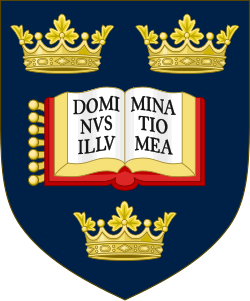| Main page | Indices | Projects |
The University of Oxford portal
The University of Oxford is a collegiate research university in Oxford, England. There is evidence of teaching as early as 1096, making it the oldest university in the English-speaking world and the world's second-oldest university in continuous operation. It grew rapidly from 1167, when Henry II prohibited English students from attending the University of Paris. When disputes erupted between students and the Oxford townspeople, some Oxford academics fled northeast to Cambridge, where they established the University of Cambridge in 1209. The two English ancient universities share many common features and are jointly referred to as Oxbridge.
The University of Oxford comprises 43 constituent colleges, consisting of 36 semi-autonomous colleges, four permanent private halls and three societies (colleges that are departments of the university, without their own royal charter). and a range of academic departments that are organised into four divisions. Each college is a self-governing institution within the university that controls its own membership and has its own internal structure and activities. All students are members of a college. Oxford does not have a main campus. Its buildings and facilities are scattered throughout the city centre and around the town. Undergraduate teaching at the university consists of lectures, small-group tutorials at the colleges and halls, seminars, laboratory work and tutorials provided by the central university faculties and departments. Postgraduate teaching is provided in a predominantly centralised fashion.
Oxford operates the Ashmolean Museum, the world's oldest university museum; Oxford University Press, the largest university press in the world; and the largest academic library system nationwide. In the fiscal year ending 31 July 2024, the university had a total consolidated income of £3.05 billion, of which £778.9 million was from research grants and contracts. In 2024, Oxford ranked first nationally for undergraduate education.
Oxford has educated a wide range of notable alumni, including 31 prime ministers of the United Kingdom and many heads of state and government around the world. As of October 2022,[update] 73 Nobel Prize laureates, 4 Fields Medalists, and 6 Turing Award winners have matriculated, worked, or held visiting fellowships at the University of Oxford. Its alumni have won 160 Olympic medals. Oxford is home to a number of scholarships, including the Rhodes Scholarship, one of the oldest international graduate scholarship programmes in the world. (Full article...)
Selected article
Bodley's Librarian is the head of the Bodleian Library, the main library at the University of Oxford. Both are named after the founder, Sir Thomas Bodley (pictured). The university's library was established in about 1320 but had declined by the end of the 16th century, so in 1598 Bodley offered to restore it. The first librarian, Thomas James, was selected in 1599, and the Bodleian opened in 1602. Bodley wanted the librarian to be diligent, a linguist, unmarried, and not a parish priest, although James persuaded him to dispense with the last two requirements. In all, 25 people have served as Bodley's Librarian, some less well than others: John Price (who held the post from 1768 to 1813) was accused of "a regular and constant neglect of his duty". The first woman, and the first foreign librarian, to run the Bodleian was Sarah Thomas (2007–13). The current librarian is Richard Ovenden. (Full article...)
Selected biography
Selected college or hall
Corpus Christi College, founded in 1517, is one of the smallest Oxford colleges in terms of student numbers. It is located on Merton Street, between Oriel College and Merton College, in the centre of the city. It was founded by Richard Foxe, the Bishop of Winchester, who intended the college as lodgings for monks from St Swythun's Priory in Winchester; however, the college moved away from this initial plan and became dedicated to the study of the classics, a subject in which it still has a strong reputation. The pelican sundial in the main quadrangle was added in 1581. John Rainolds, Corpus's seventh President, was involved in the inception and translation of the King James Bible, published in 1611. Former students include John Keble (a leader of the Oxford Movement, later to be commemorated by the foundation of Keble College), the philosopher Isaiah Berlin and the British Labour Party brothers and politicians Ed and David Miliband. The college won the 2009 series of the BBC television quiz programme University Challenge, under the leadership of Gail Trimble, but were later disqualified for fielding an ineligible player. (Full article...)
Selected image

Did you know
Articles from Wikipedia's "Did You Know" archives about the university and people associated with it:
- ... that Christopher Tin (pictured) is the first Fulbright scholar for film scoring?
- ... that the world's largest mathematical experiment, designed by Brian Butterworth, found women to be faster than men at subitizing?
- ... that Englishman James McFarlane was appointed a Knight Commander of the Royal Norwegian Order of Saint Olav for his eight-volume work Oxford Ibsen?
- ... that British plant physiologist Daphne Osborne showed that the gas ethylene is a natural plant hormone which regulates ageing and the shedding of leaves and fruits?
- ... that millionaire's daughter Rose Dugdale joined an IRA active service unit and took part in the first helicopter bombing raid on the British Isles in 1974?
Selected quotation
Selected panorama
On this day
Events for 14 August relating to the university, its colleges, academics and alumni. College affiliations are marked in brackets.
|
Births
|
Deaths
|
Wikimedia
The following Wikimedia Foundation sister projects provide more on this subject:
-
Commons
Free media repository -
Wikibooks
Free textbooks and manuals -
Wikidata
Free knowledge base -
Wikinews
Free-content news -
Wikiquote
Collection of quotations -
Wikisource
Free-content library -
Wikiversity
Free learning tools -
Wikivoyage
Free travel guide -
Wiktionary
Dictionary and thesaurus














